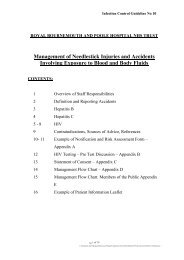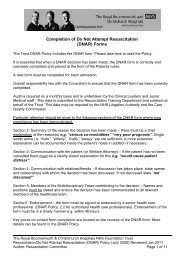- Page 1 and 2:
A meeting of the Board of Directors
- Page 3 and 4:
THE ROYAL BOURNEMOUTH AND CHRISTCHU
- Page 5 and 6:
In response to a question from KT a
- Page 7 and 8:
how this was being rolled out throu
- Page 9 and 10:
still challenged at times;• that
- Page 11 and 12:
(c)Stroke Performance (Presentation
- Page 13 and 14:
• nurse staffing was already bein
- Page 15 and 16:
(b) Informatics Strategy (Appendix
- Page 17 and 18:
(b)Monitor’s Guidance for NHS Pro
- Page 19 and 20:
THE ROYAL BOURNEMOUTH AND CHRISTCHU
- Page 21 and 22:
BOARD OF DIRECTORSMeeting Date and
- Page 23 and 24:
Quality Impact Assessments 2013/14T
- Page 26 and 27:
Example of completed QIATransformat
- Page 28 and 29:
Board of Directors Part 114th June
- Page 30 and 31:
Board of Directors Part 114th June
- Page 32 and 33:
Area Indicator Measure Target Monit
- Page 34 and 35:
Trust Performance Dashboard - Quali
- Page 36 and 37:
Board of DirectorsJune 2013Financia
- Page 38 and 39:
Board of DirectorsJune 20138. Recom
- Page 40 and 41:
BOARD OF DIRECTORSMeeting Date and
- Page 42 and 43:
Board of Directors Part 114 June 20
- Page 44 and 45:
Board of Directors Part 114 June 20
- Page 46 and 47:
Board of Directors Part 114 June 20
- Page 48 and 49:
Board of Directors Part 114 June 20
- Page 50 and 51: Board of Directors Part 114 June 20
- Page 52 and 53: Board of Directors Part 114 June 20
- Page 54 and 55: Board of Directors Part 114 June 20
- Page 56 and 57: Board of Directors Part 114 June 20
- Page 58 and 59: Board of Directors Part 114 June 20
- Page 60 and 61: Board of Directors Part 114 June 20
- Page 62 and 63: Board of Directors Part 114 June 20
- Page 64 and 65: Board of Directors Part 114 June 20
- Page 66 and 67: Board of Directors Part 114 June 20
- Page 68 and 69: Board of Directors Part 114 June 20
- Page 70 and 71: Board of Directors Part 114 June 20
- Page 72 and 73: Board of Directors Part 114 June 20
- Page 74 and 75: Board of Directors Part 114 June 20
- Page 76 and 77: Board of Directors Part 114 June 20
- Page 78 and 79: Board of Directors Part 114 June 20
- Page 80 and 81: Board of Directors Part 114 June 20
- Page 82 and 83: EnforcementGuidance28 March 2013Mon
- Page 84 and 85: ForewordThe Health and Social Care
- Page 86 and 87: 1 IntroductionThe Health and Social
- Page 88 and 89: Table 1.1 Monitor’s enforcement p
- Page 90 and 91: Licence enforcementDiscretionary re
- Page 92 and 93: Competition lawMonitor has concurre
- Page 94 and 95: 2 PrioritisationThis chapter sets o
- Page 96 and 97: We also recognise that the actions
- Page 98 and 99: 3 Imposing discretionary requiremen
- Page 102 and 103: Deterring similar breaches by other
- Page 104 and 105: An important objective of imposing
- Page 106 and 107: 4 Enforcement - case procedures4.1
- Page 108 and 109: provide regular case updates to par
- Page 110 and 111: including in the application eviden
- Page 112 and 113: In certain circumstances, Monitor m
- Page 114 and 115: Non-compliance penaltiesUnder sched
- Page 116 and 117: Notice of Intent (section 90)Where
- Page 118 and 119: • any incidental or consequential
- Page 120 and 121: Monitor will have concurrent powers
- Page 122 and 123: the first two decision-making point
- Page 124 and 125: Non-compliance penaltiesA provider
- Page 126 and 127: AnnexMonitor’s powers of enforcem
- Page 128 and 129: a) has provided, or is providing, a
- Page 130 and 131: c) the matters likely to be taken i
- Page 132 and 133: Monitor, 4 Matthew Parker Street, L
- Page 134 and 135: Board of Directors - Part I14 th Ju
- Page 136 and 137: Board of Directors - Part I14 th Ju
- Page 138 and 139: Board of Directors - Part I14 th Ju
- Page 140 and 141: Board of Directors - Part I14 th Ju
- Page 142 and 143: Board of Directors Part I14 th June
- Page 144 and 145: Board of Directors Part I14 th June
- Page 146 and 147: BOARD OF DIRECTORSMeeting Date and
- Page 148 and 149: Job DescriptionPOST TITLEREPORTS AN
- Page 150 and 151:
MEDICAL LEADERSHIPAs Medical Direct
- Page 152 and 153:
PERSON SPECIFICATIONQualifications:
- Page 154 and 155:
CALDICOTT GUARDIAN ROLE DESCRIPTION
- Page 156 and 157:
BOARD OF DIRECTORSMeeting Date and
- Page 158 and 159:
Transporting sharps containersIn or
- Page 160 and 161:
NHS Winter Heroes recognisedFour me
- Page 162 and 163:
Leadership programmesSupported by N
- Page 164 and 165:
Board of Directors - Part I14 June
- Page 166 and 167:
Board of Directors - Part I14 June
- Page 168 and 169:
DatePublicationTitleInformationPage
- Page 170 and 171:
DatePublicationTitle3 May 2013www.s
- Page 172 and 173:
May 2013 l 6
- Page 174 and 175:
DatePublicationTitleInformationPage
- Page 176 and 177:
DatePublicationTitleInformationPage
- Page 178 and 179:
DatePublicationTitleInformationPage
- Page 180 and 181:
DatePublicationTitle13 May 2013www.
- Page 182 and 183:
DatePublicationTitleInformationPage
- Page 184 and 185:
DatePublicationTitle14 May 2013www.
- Page 186 and 187:
DatePublicationTitleInformationPage
- Page 188 and 189:
DatePublicationTitle20 May 2013www.
- Page 190 and 191:
DatePublicationTitleInformationPage
- Page 192 and 193:
DatePublicationTitle24 May 2013www.
- Page 194 and 195:
DatePublicationTitle24 May 2013www.
- Page 196 and 197:
DatePublicationTitleInformationPage
- Page 198 and 199:
DatePublicationTitle27 May 2013www.
- Page 200 and 201:
DatePublicationTitleInformationPage
- Page 202 and 203:
DatePublicationTitleInformationPage
- Page 204 and 205:
Board of Directors Business Program
















